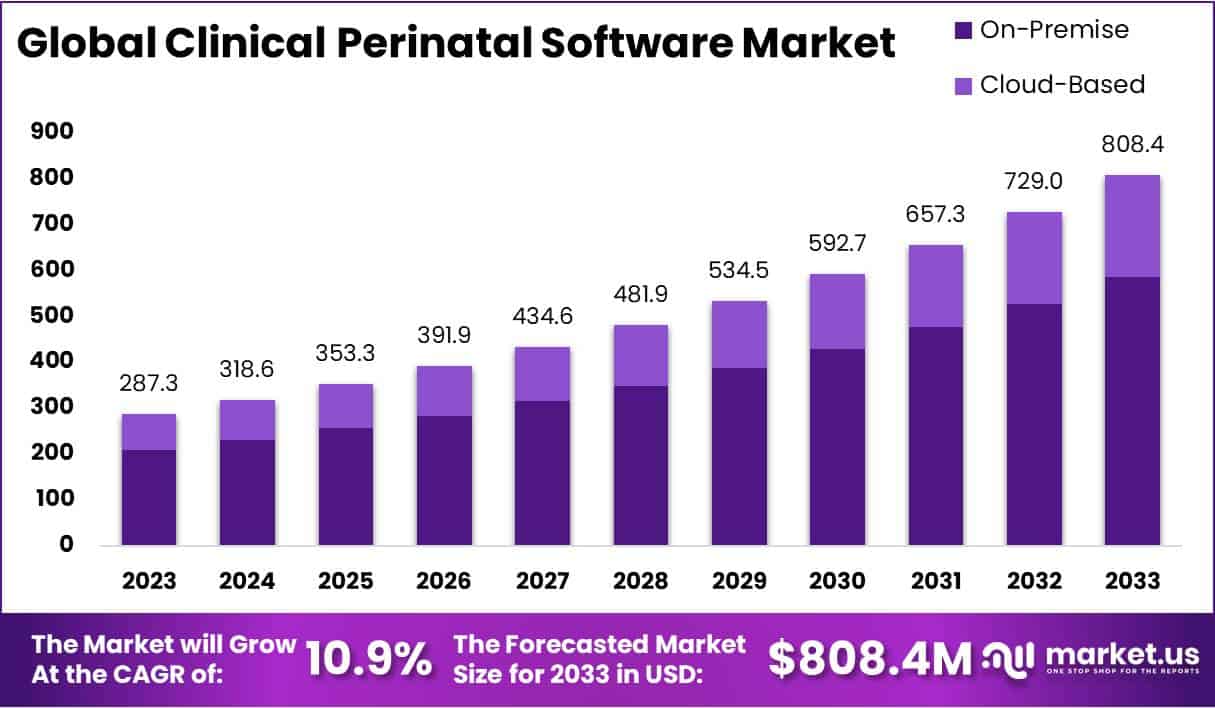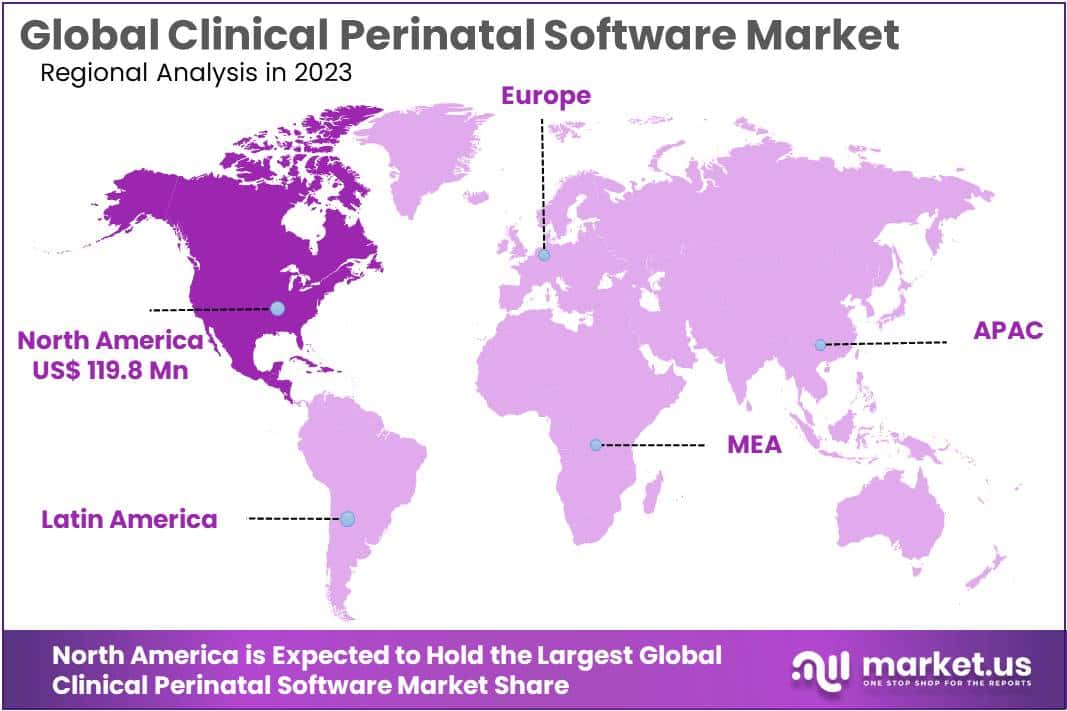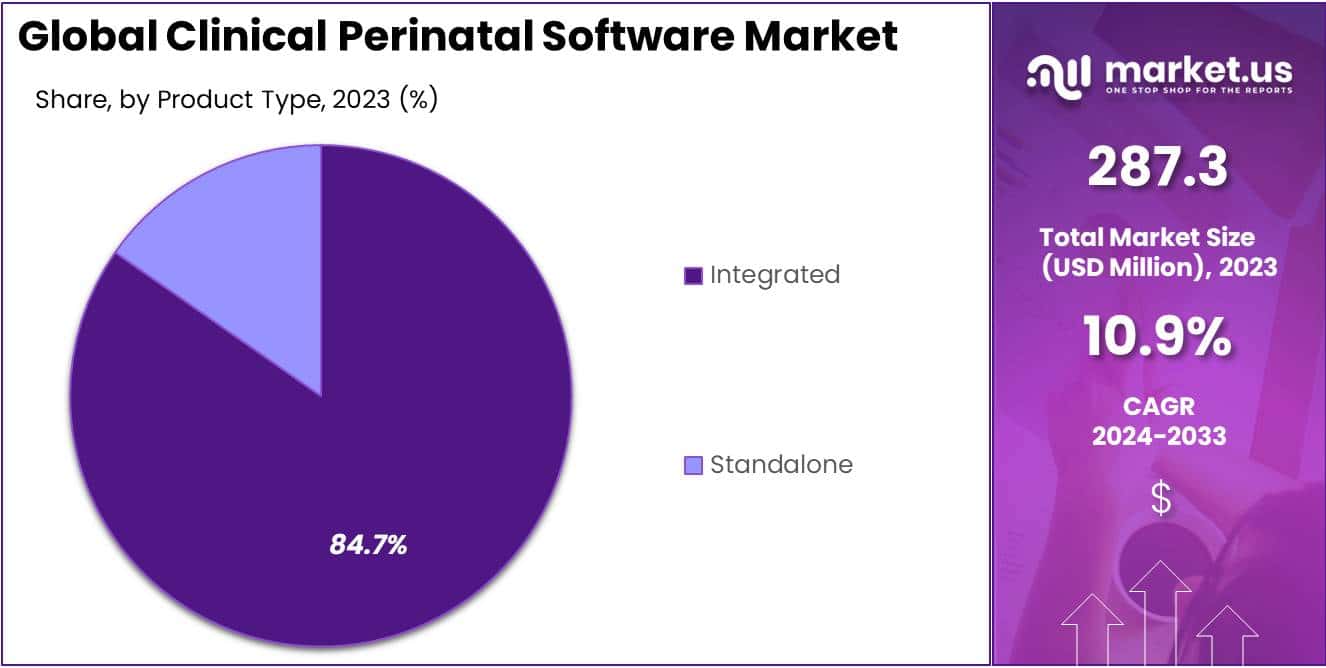New York, Jan. 11, 2024 (GLOBE NEWSWIRE) -- According to market.us, the Clinical Perinatal Software Market is projected to experience significant expansion through 2033, reaching an estimated market size of USD 808.4 Million. This represents a notable jump from its 2023 valuation of USD 287.3 Million. Furthermore, market.us projects an impressive compound Annual Growth Rate (CAGR) of 10.9% between 2024-2033 for this market's projected lifespan.
Clinical Perinatal Software refers to specialized solutions addressing clinical needs in the perinatal stage, pre and post-childbirth. Tailored for healthcare professionals, these tools aid in managing maternal and neonatal health during pregnancy, labor, and postpartum. The market analysis explores vital aspects like size, share, growth patterns, trends, and competition. The sector's expansion is fueled by evolving technology, advanced perinatal care software, and the increasing integration of IT in healthcare. This integration streamlines patient information management, enhances communication among healthcare professionals, and elevates care quality. The competitive landscape insights and market opportunities guide stakeholders in strategic decision-making for potential revenue growth.
The report provides a full list of key companies, their strategies, and the latest developments. Download a PDF Sample before buying @ https://market.us/report/clinical-perinatal-software-market/request-sample/

Key Takeaway:
- Market Growth: The Clinical Perinatal Software Market is projected to achieve USD 808.4 Mn by 2033, exhibiting a CAGR of 10.9% from 2024 to 2033, a significant increase from USD 287.3 Mn in 2023.
- Deployment Trends: In 2023, the 'On-Premise' segment accounted for 72.5% of revenue, primarily due to data security advantages. However, the 'Cloud-Based' segment is expected to experience the highest CAGR.
- Product Preferences: The 'Integrated' segment dominated in 2023, capturing 84.7% of revenue, driven by the demand for a seamless workflow. On the other hand, the 'Standalone' segment faced challenges with integration.
- Application Insights: In 2023, 'Fetal Monitoring Data Services' claimed 55.3% of sales, focusing on precise monitoring. Meanwhile, 'Workflow Management Software' anticipates the fastest CAGR.
- End-Use Dynamics: 'Hospitals/Clinics' held a 63.8% market share in 2023, thriving on high foot traffic and sophisticated software solutions.
- Regional Dominance: North America led the market in 2023 with a 41.7% market share and USD 197.7 Mn value, driven by advanced healthcare infrastructure and strategic collaborations.
Factors affecting the growth of the Clinical Perinatal Software industry
The growth of the Clinical Perinatal Software industry is shaped by several influential factors. Technological advancements, such as the integration of artificial intelligence and data analytics, enhance the capabilities of clinical perinatal software, leading to more accurate predictions and personalized care plans. A notable trend contributing to the industry's expansion is the rising maternal age, prompting a higher demand for perinatal care and the adoption of software solutions. Increased awareness about prenatal and postnatal care, coupled with the benefits of utilizing software for pregnancy-related data management, is driving market growth. Additionally, the global population growth and a shifting regulatory environment impact the adoption of clinical perinatal software. Collaboration and partnerships among software providers, healthcare institutions, and technology companies foster comprehensive and integrated solutions, aligning with patient-centric healthcare models.
Moreover, economic conditions, including healthcare budgets and spending capabilities, play a role in the industry's dynamics. The cost-effectiveness and potential for improved outcomes offered by clinical perinatal software may drive adoption, especially in resource-constrained environments. Data security and privacy concerns are critical considerations, necessitating compliance with regulations and robust security measures. Cultural and societal factors, such as attitudes towards pregnancy and healthcare practices, influence the acceptance of perinatal software. Understanding these factors is crucial for stakeholders to effectively navigate challenges and capitalize on growth opportunities in the ever-evolving Clinical Perinatal Software landscape.
Regional Analysis
North America holds a dominant market share for Clinical Perinatal Software Market with over 41.7% and USD 197.7 Million worth. This success can be attributed to North America's cutting-edge healthcare infrastructure that integrates advanced technologies. Commitment to maternal and neonatal healthcare in North America can be seen through its strategic partnerships and supportive regulatory frameworks, cementing North America's presence globally. A mature healthcare ecosystem in the region allows for smooth adoption of innovative perinatal software, with providers being used to integrating new technologies.
Proactive investment strategies bolster North America's leadership position, allocating resources to research and development to ensure an ongoing supply of improved software solutions. Globally, North America exerts an unmistakable influence over adoption rates for perinatal software. North America's success in 2023 can be attributed to an array of factors, including advanced infrastructure, healthcare commitment, favorable regulations, an established ecosystem, proactive investments and global impact. All these elements come together and contribute to its prominence on this front. As such, North America plays an essential role in driving clinical perinatal software adoption worldwide.
Uncover the actionable insights tailored for your business strategy. Request our brochure to get more https://market.us/report/clinical-perinatal-software-market/#inquiry

Scope of the Report
| Report Attributes | Details |
| Market Value 2023 | USD 287.3 Million |
| Forecast Revenue 2033 | USD 808.4 Million |
| CAGR (2024 to 2033) | 10.9% |
| North America Revenue Share | 41.7% |
| Base Year | 2023 |
| Historic Period | 2018 to 2022 |
| Forecast Year | 2024 to 2033 |
Market Drivers
Due to advances in medical technology, the clinical perinatal software market is flourishing. New software solutions are being deployed to enhance perinatal care with real-time data streaming into care delivery, improved patient outcomes, and streamlined workflows for healthcare professionals. This growth is propelled by an increasingly global trend of increasing maternal age, driving demand for specialized perinatal care services. Clinical perinatal software specifically tailored for older mothers provides comprehensive monitoring, risk analysis, and customized care plans tailored specifically to them.
Given the increasing rates of high-risk pregnancies, advanced tools for monitoring and managing these cases must also be implemented. Clinical perinatal software meets this need by offering advanced analytics and decision support systems, leading to early identification of complications and decreased maternal and neonatal mortality rates. Government initiatives and healthcare reforms around the globe also foster the adoption of clinical perinatal software. Through incentives and policies supporting digital health solutions, healthcare facilities invest in advanced perinatal software thereby improving maternal and neonatal healthcare on an overall scale.
Market Restraints
Data security concerns persist in the clinical perinatal software market despite technological progress. The sensitivity of patient information necessitates robust security measures, creating hesitation due to the fear of unauthorized access or data breaches. Additionally, the high initial costs of implementing these software solutions act as a significant barrier for smaller healthcare facilities. Budget constraints and the need for extensive training contribute to the reluctance of some institutions to invest in these advanced technologies.
Interoperability challenges further hinder the seamless exchange of data among different healthcare systems, limiting the potential impact of clinical perinatal software on improving care coordination. Moreover, resistance to change within traditional healthcare practices and some settings poses a challenge to the widespread adoption of these digital solutions. Overcoming this resistance requires targeted educational efforts and effective change management strategies.
Market Opportunities
The integration of clinical perinatal software with telehealth services stands out as a promising avenue for growth. This synergy facilitates remote monitoring, virtual consultations, and telemedicine options, thereby improving perinatal care accessibility, particularly in underserved areas. The market expansion potential is significant. Additionally, the trend toward personalized medicine opens doors for tailored perinatal care solutions. By harnessing genetic data, patient history, and real-time monitoring, clinical perinatal software can craft personalized care plans, addressing individual health needs and preferences.
Another noteworthy opportunity lies in global expansion, tapping into emerging markets. Collaboration with local healthcare entities, customization for diverse healthcare settings, and addressing region-specific needs can lead to substantial market penetration. Investing in research and development remains crucial, with ongoing efforts in predictive analytics, artificial intelligence, and machine learning algorithms enhancing the capabilities of clinical perinatal software, making it appealing to healthcare providers seeking cutting-edge solutions.
Immediate Availability | Purchase Your Copy of This Exclusive Research Report https://market.us/purchase-report/?report_id=54332
Report Segmentation of the Clinical Perinatal Software Market
Deployment Mode Insight
In 2023, the dominant force in the deployment market was the 'On-Premise' segment, contributing over 72.5% of the revenue. This surge was primarily propelled by its advantages in data security, retrieval, and access. The segment's anticipated growth is fueled by flexibility and cost-effectiveness in terms of IT overhead. Conversely, the 'Cloud-Based' sector is poised for the highest Compound Annual Growth Rate (CAGR) due to real-time tracking and remote accessibility, driving significant expansion. The clinical perinatal software market is also on an upward trajectory, supported by advanced features like enhanced flexibility, heightened accessibility, and seamless data backup, ensuring a continued growth trajectory.
Product Type Insight
In 2023, the clinical perinatal software market saw a substantial share of its revenue, approximately 84.7%, coming from the 'Integrated' product segment. This surge is attributed to the growing demand among medical professionals for a seamless workflow integration, supported by technological advancements and increasing adoption rates. The Integrated category is expected to experience rapid growth in the foreseeable future. Simultaneously, the 'Standalone' segment also played a significant role in contributing to market revenue during the same period. Standalone clinical perinatal software is tailored for specific operations, but its growth is anticipated to be limited due to inherent constraints, including the inability to integrate data and a lack of add-on options.

Application Insight
In 2023, the Fetal Monitoring Data Services segment dominated the market, representing over 55.3% of sales and securing the highest revenue share. These services play a crucial role in ensuring precise fetal heartbeat and uterine contraction monitoring capabilities. The integration of mobile fetal monitoring not only enhances these capabilities but also provides patients with remote access to vital information about infant development, contributing significantly to the segment's growth.
Looking ahead, the Workflow Management Software segment is poised for the fastest Compound Annual Growth Rate (CAGR). This is driven by the global increase in hospitals, maternity clinics, and healthcare institutions, coupled with a rising demand for workflow management software. The segment's expansion is further fueled by benefits such as streamlined administrative processes, real-time data access, and increased productivity.
End-User Insight
In 2023, the healthcare industry saw significant dominance by the Hospitals/Clinics segment, securing a notable market share of over 63.8%. This sector's prevalence is attributed to its substantial foot traffic and the utilization of advanced software, contributing to its widespread adoption. Many hospitals have strategically partnered with diverse insurance providers, facilitating prompt and efficient reimbursements, thereby fostering increased product acceptance.
Meanwhile, the Maternity Clinics segment is poised for remarkable growth, projected to achieve the highest Compound Annual Growth Rate (CAGR). The surge in both developed and emerging nations in the number of maternity clinics serves as a primary driver for this expansion. Factors such as rising disposable incomes and heightened awareness further contribute to the anticipated growth trajectory of this segment in the upcoming years.
Sample Report Request: Unlock Valuable Insights for Your Business: https://market.us/report/clinical-perinatal-software-market/request-sample/
Recent Developments in the Clinical Perinatal Software Market
- In December 2023, McKesson Corporation, unveiled a telemedicine platform for perinatal care, focusing on enhancing specialist access in rural areas.
- In November 2023, K2 Medical Systems launched a cloud-based fetal monitoring system tailored for smaller hospitals and clinics.
- In August 2023, Sotera Health, introduced an educational program for healthcare providers, focusing on the use of perinatal software to improve outcomes.
- In July 2023, GE HealthCare released an upgraded Fetal Care Management System, boasting improved data analytics and workflow capabilities.
- In June 2023, Clinical Computer Systems Inc. updated its OB-GYN EMR system incorporating enhanced perinatal features like fetal growth tracking and maternal health monitoring.
- In May 2023, PeriGen Inc. revealed a strategic partnership with a major US hospital system implementing their cloud-based perinatal software platform.
- In March 2023, Philips introduced the IntelliSpace Perinatal Platform, featuring advanced AI for fetal monitoring to enhance perinatal outcomes.
- In February 2023, Huntleigh Healthcare launched the SONICAID S2 fetal doppler equipped with Bluetooth for remote monitoring and data sharing.
Market Segmentation
Deployment Mode
- On-Premise
- Cloud-Based
Product Type
- Integrated
- Standalone
Application
- Workflow Management
- Fetal Monitor Data Services
- Patient Documentation
End-User
- Hospital/Clinics
- Maternity Clinics
By Geography
- North America
- US
- Canada
- Europe
- Germany
- France
- The UK
- Spain
- Italy
- Russia
- Netherland
- Rest of Europe
- Asia Pacific
- China
- Japan
- South Korea
- India
- New Zealand
- Singapore
- Thailand
- Vietnam
- Rest of APAC
- Latin America
- Brazil
- Mexico
- Rest of Latin America
- Middle East & Africa
- South Africa
- Saudi Arabia
- UAE
- Rest of MEA
Competitive Landscape
In the dynamic Clinical Perinatal Software Market, influential entities such as Koninklijke Philips N.V., GE HealthCare Technologies Inc., Huntleigh Healthcare Limited, and PeriGen Inc. significantly influence industry dynamics. Koninklijke Philips N.V. stands out in healthcare technology, consistently delivering innovative solutions through dedicated research and development. GE Healthcare Technologies Inc., a leader in medical imaging and diagnostics, establishes industry benchmarks with precision and reliability. Huntleigh Healthcare Limited focuses on maternal-fetal care, providing solutions that enhance monitoring and improve patient outcomes. PeriGen Inc. specializes in fetal surveillance, contributing unique perspectives to perinatal care. The market benefits from diverse players fostering competition and driving innovation, collectively shaping advancements in global maternal and fetal healthcare. As these key players collaborate, they positively impact the evolving market landscape.
Market Key Players
- Koninklijke Philips N.V.
- GE HealthCare Technologies Inc.
- Huntleigh Healthcare Limited
- PeriGen Inc.
- McKesson Corporation
- Clinical Computer Systems Inc.
- K2 Medical Systems Ltd.
- Sotera Health
- Harmony Healthcare IT
- Athenahealth Inc.
- Other Key Players
Browse More Related Reports
- eClinical Solutions Market size is expected to be worth around USD 27 Bn by 2032 at a CAGR of 12.8% For forecast from 2022 to 2032.
- Clinical Trial Imaging Market was worth USD 1,067.3 million in 2022. This market is expected to grow at a CAGR of 7.8% between 2023-2032.
- AI In Medical Imaging Market Size accounted for USD 754 Mn in 2022 and is projected to reach USD 14.8 Mn by 2032, with a 34.7% CAGR.
- Clinical Workflow Solutions Market size is expected to be worth around USD 36.0 Billion by 2033, from USD 10.8 Billion in 2023
- Global eHealth market size is expected to be worth around USD 393.6 billion by 2032 from USD 97.4 billion in 2022.
- Home Healthcare Market size is expected to be worth around USD 797.8 billion by 2032 from USD 369.3 billion in 2022.
- Insulin market size is expected to be worth around USD 28 Bn by 2032 at a CAGR of 6.2% For forecast from 2022 to 2032.
- Medical Imaging Market size is expected to be worth around USD 48.8 Billion by 2032 from USD 29.2 Billion in 2022, at a CAGR of 5.40%
- Disposable Gloves Market size is expected to be worth around USD 19.5 bn by 2033 from USD 12.9 Bn in 2023, at a CAGR of 4.2% (2024-2033).
- Population Health Management Market is expected to grow at a CAGR of 14.1% over the next 10 years and will reach USD 100.6 Bn in 2032.
About Us:
Market.US (Powered by Prudour Pvt Ltd) specializes in in-depth market research and analysis and has been proving its mettle as a consulting and customized market research company, apart from being a much sought-after syndicated market research report-providing firm. Market.US provides customization to suit any specific or unique requirement and tailor-makes reports as per request. We go beyond boundaries to take analytics, analysis, study, and outlook to newer heights and broader horizons.
Follow Us on LinkedIn
Our Blog:
